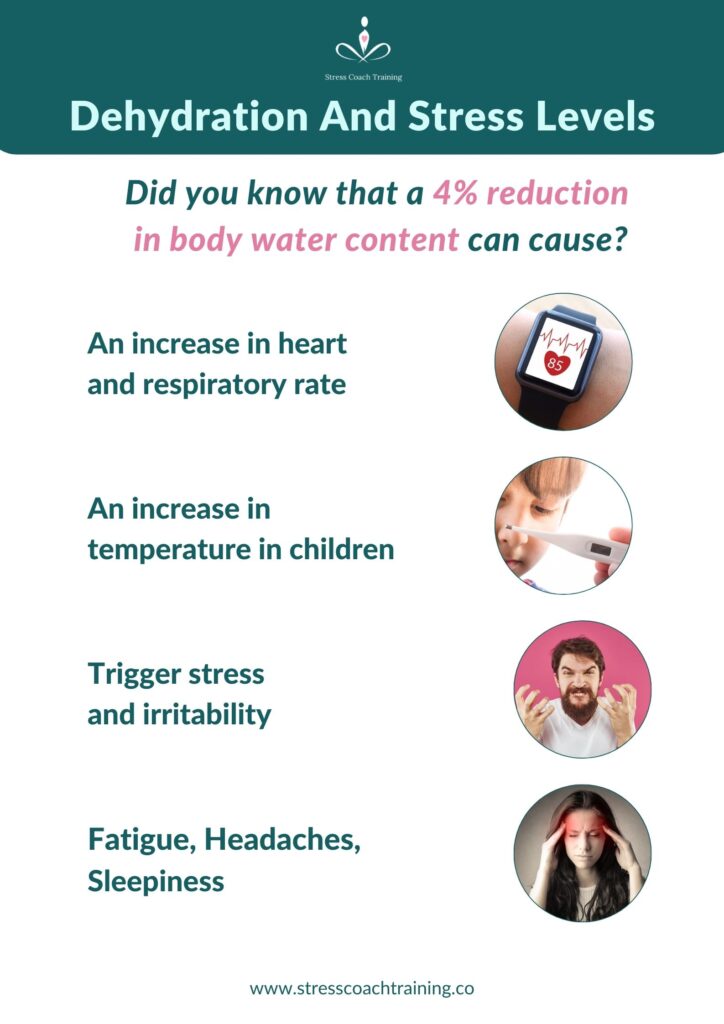Dehydration And Stress Levels
Why Dehydration Can Cause Major Stress To The Mind And Body’s Stress Levels.
Why dehydration puts serious pressure on the body’s organs and systems to work harder. Why we need enough water intake to balance the body’s natural homeostasis, healing and rejuvenating process. Why Dehydration can be mild to severe and includes a wide range of symptoms.
What is Dehydration?
Dehydration is when your body has lost more fluid than what it is taking in.
Adequate water intake is required for digestion, nutritional absorption, and distribution. It is also needed to support our metabolic, immune, endocrine and respiratory system as well as detoxification.Our bodies are not designed to hold on to water so it needs to be hydrated daily or it can start creating an imbalance, put pressure on our physical stress levels.
Chronic Dehydration and Severe Dehydration
Chronic Dehydration puts a lot of pressure on our body and brain especially our kidney function, severe dehydration is life threatening.In fact according to BMC Public Health “..Fluid deficit of 4% decreases performance, causes headaches, irritability, sleepiness and increases respiratory rate with increase in temperature among children [12]. Dehydration also impairs muscle endurance and decreases muscle strength [13]. The fluid depletion of more than 8% can cause death [14]
Common Signs Of Dehydration
- a dry mouth
- thirsty
- feeling lightheaded.
- tired, sleepiness
- having dark coloured, strong-smelling urine.
- passing urine less often than usual.

Dehydration And Stress Levels On The Body
Do you know what a 4% reduction in body water content can do to you mentally, emotionally and physically?
Dehydration can trigger an increase in heart rate and respiration.
Dehydration can cause an increase in irritability and emotional vulnerability.
Dehydration can cause a temperature increase in children
Dehydration can cause confusion, fatigue and sleepiness
Dehydration is often confused for hunger
Dehydration can increase our anxiety and stress levels
Water And Our Mental, Physical Stress Levels
Moderate to severe symptoms of dehydration include lowered blood pressure, increased heart rate, fainting, dizziness and emotional outbursts.
Dehydration can be one influencing fact of increases stress levels at work especially in warmer weather or warm environments like factories, hospitals, nursing homes, schools….
Adequate water intake is required for digestion, nutritional absorption, and distribution. It is also needed to support our metabolic, immune., endocrine and respiratory system as well as detoxification.
In a healthy adults of normal Body Mass Index (BMI), 60% of the body weight is water. Even a 2% decrease in water intake can affect your physical, mental and visual cognitive abilities impact our stress levels.
Amanda Carlson, RD director of performance nutrition at Athletes’ Performance, a trainer of world-class athletes states that “Studies have shown that being just half a litre dehydrated can increase your cortisol levels” Cortisol is a major stress hormone that can play havoc with our sleep when elevated, it can affect memory, learning, immune system, blood pressure…
The recommended intake of water per person is approx 0.5 oz per Ilb of weight, that is why good hydration as an important part of managing stress and improving your health and wellbeing.
Importance Of Listening To What Our Body Needs
So many people don’t even notice when they are dehydrated because they are so busy, so distracted and disconnected from their bodies that is why it is so important in stress management and holistic wellbeing to help support clients on how to listen to what their body really needs rather than what the mind or ego thinks it needs. The more we can learn how to tune into our body learn what increases and reduces our stress levels, we start to live a more happier and healthier balanced life.






Great reminder Eileen to keep ourselves and our children hydrated